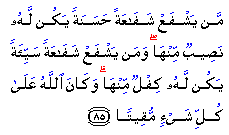Getting Credits, Eid Fun, Grief on Eid
Issue 350 » October 28, 2005 - Ramadan 24, 1426
General
| Living the Quran |
Al-Nisa
(The Women)
Get the credit! It's a matter of choice Watch what you do and say Source: |
| Understanding the Prophet's Life |
| Celebrating Eid Narrated Anas bin Malik: Narrated Abu Sa'id Al-Khudri: Narrated Jabir bin 'Abdullah: Narrated Aisha: It was the day of Eid, and the Black people were playing with shields and spears; so either I requested the Prophet or he asked me whether I would like to see the display. I replied in the affirmative. Then the Prophet made me stand behind him and my cheek was touching his cheek and he was saying, "Carry on! O Bani Arfida," till I got tired. The Prophet asked me, "Are you satisfied (Is that sufficient for you)?" I replied in the affirmative and he told me to leave. Narrated 'Urwa on the authority of 'Aisha: Source: |
| Blindspot! |
Dealing with grief on Eid While Eid is definitely a time of joy and happiness, it's also one of sadness for those who recall happy occasions with deceased family members. Whether we're experiencing this sadness ourselves, or know someone who is, grief is something we can't ignore. Pray to Allah (Dua) One way of dealing with sadness on Eid is through Dua (supplication). Once a man from the tribe of Salmah came and said to the Prophet, peace be upon him: ‘O Messenger of Allah! Do my parents have rights over me even after they have died? And Rasulullah said: Yes. You must pray to Allah to bless them with His Forgiveness and Mercy, fulfill the promises they made to anyone, and respect their relations and their friends. (Abu Daud, Ibn Majah). Why not use Eid to make Dua and remember deceased parents? As well, why not use it as an occasion to visit and show respect to their relatives and friends? This will alleviate some of the pain of missing them on an occasion when families get together and celebrate. Cherish the good memories If the deceased is another relative or friend, why not invite over those who remember him or her on Eid day for a meal followed by an Eid gift. This way you can be with those who cherish the memories of your loved one. Turning the tables, if you know someone dealing with personal grief this Eid, make a special effort to invite them over. If this is their first Eid after their loved one has passed away, then extra sensitivity may be needed. Maybe you can take them out for a meal at a restaurant instead of having a large get-together so that you can both share in fond memories of the relative or friend. Avoid Isolation Personal grief isn't just connected to the death of a loved one. It could be related to family problems, losing a job, failing grades or more. In this case, the need to get together with others on Eid is even more important. The key is to avoid isolation on a happy occasion. If you have a family member or friend who is suffering through such problems, inviting them over on Eid day can lift their spirits. This can help them break the cycle of depression and hopelessness they may be going through. Offer them words of Dua, hope and comfort which can also help them cope with their difficult situation. This Eid, if you see someone suffering, try to comfort them. We must make a special effort to help anyone in need, and Eid day, which is a happy occasion, is an excellent occasion to do so. Source: |
